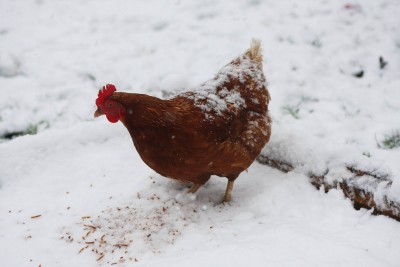Preparing Poultry for Winter
Amy Barkley, Livestock Specialist
Southwest New York Dairy, Livestock and Field Crops Program

As the daylight hours continue to wane and the cold begins to weave its way across the landscape, it is apparent that winter is coming, and our minds shift to preparing our livestock for winter. Poultry are hardier than we think, and with a few modifications to housing and care, they will be prepared for the bitter winds and incessant snowfall which are part of life in SWNY.
The first step in preparation is to make sure that there is a coop or barn available to the birds and that it is protective. Windows and doors should be totally closed when not in use, and openings that would cause drafts should be covered. If poultry are living in a mobile coop that is rotated on pasture during the summer months, the coop should be brought to an area that is easily accessible. If it has open sides, now is the time to cover those with tarps, thick plastic sheeting, or other solid siding.
However, there is no need to insulate the coop like a house; this is actually not recommended. Poultry produce a great deal of moisture from breathing, their excretion, and water spillage. Air flow in poultry housing is important in the winter to allow for air exchange and release of moisture from the living space. Poultry can tolerate cold on its own, but when cold is combined with a humid environment, it can lead to stress due to increased ammonia, increased potential of bumblefoot, which is an infection of the foot and/or toe pads caused by over exposure to wet manure, and increased potential for frost bite. A good way to check coop or barn moisture is to look at metal items in the coop such as nest boxes or feeders in addition to windows and walls. If condensation is seen on these surfaces, then it is too humid, and ventilation will need to be increased via the installation of vents, cracking of windows, and/or removing some excess insulation. High litter moisture can be addressed by regular removal of soiled litter and/or addition of dry, absorbent bedding material, such as straw, kiln-dried sawdust, or wood shavings.
Roosting poultry, including chickens, turkeys, guineas, and Muscovy ducks, should have perches that allow their feet to set flat. Round and narrow perches result in feet wrapping around the bar, which does not allow for the insulation of the toes by the feathers when the hen sits, which can result in frost bite. Ground-dwelling fowl such as ducks and geese should be bedded with clean, absorbent materials. This allows for the birds to stay warmer than if they were to set on a non-bedded floor.
Feeders will not need much extra maintenance in the wintertime, except for removing wet food that has become frozen and inaccessible. This will typically be seen in flocks of or containing waterfowl, rather than flocks containing only chickens, guineas, or turkeys. Keep in mind that poultry should be fed a complete ration formulated for their age and species, and that they will consume more feed over the winter months to meet their higher body energy demands.
When choosing a waterer for the winter, if the barn or coop is not heated, a more open flow type waterer will slow the speed if ice formation which can potentially plug integral parts of a waterer's supply mechanism. While the use of shallow buckets can be a solution to this potential issue, caution should be used to monitor those birds with beards or long waddles, as they can dip into the water during drinking, which may predispose them to frost bite. Be prepared to check water 2-3x daily in the winter to ensure birds have an adequate supply. If a waterer is heated, it should be checked at least once per day to ensure continued functionality.
When deciding whether to provide heat to a coop or barn, know that poultry will acclimate to the outdoor temperatures with little or no need for supplemental heat if they are provided with a draft-free coop. Furthermore, supplemental heat sources have varying levels of safety. Heat lamps are the most dangerous because birds can inadvertently knock or fly into them, resulting in damage to the lamp or bulb, increasing the risk of starting a fire. Two safer options include heat plates and ceiling-mounted commercial heating units. If a heat lamp must be used, selecting one that is totally contained is safer than some of the standard heat lamps used commonly during chick rearing.
While there are a few things to consider, getting poultry coops and barns ready for the colder, snowier months ahead can be easy. With these preparations in place, poultry can have a low-stress winter.
If you have questions on winter preparation or care of poultry, reach out to Amy Barkley, Livestock and Beginning Farm Specialist, at amb544@cornell.edu or (716) 640 - 0844.
Upcoming Events
WEBINAR - Automated Milking Systems Efficiency: Balancing Focus on Individual Cows and System Optimization
May 8, 2024
Please join Cornell the SWNY team and MSU Extension for our talk with Dr. Pablo Silva Boloña on improving efficiency of Automated milking systems by focusing on milking settings for individual and group success.
Broiler Field Day at Sunny Cove Farm
June 6, 2024
Alfred Station, NY
Join us for a field day to explore broiler production, processing, and finances. Meghan Snyder of Sunny Cove Farm will be our host. She raises small batches of organic broilers, processing them on-farm under the 1,000 bird exemption.
Stockmanship and Stewardship 2024
October 25, 2024
Hamburg, NY
Save the date!! The event is one of 4 across the US and is a two-day educational experience featuring low-stress cattle handling demonstrations, Beef Quality Assurance educational sessions, facility design sessions, and industry updates.
Announcements
No announcements at this time.





